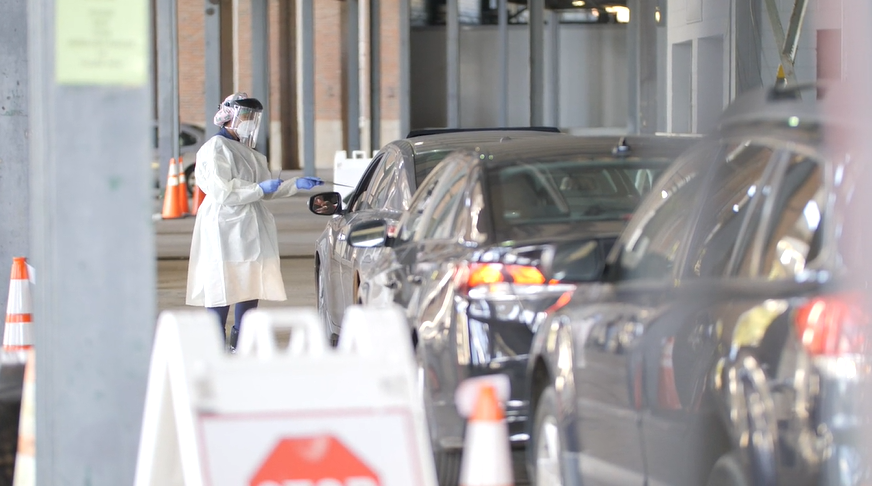
By Sydney Melson
The Birmingham Times

Alabama hospitals this week hit a new high for COVID-19 patients and health officials see no relief in sight.
The Alabama Department of Public Health (ADPH) reported the state’s hospitals were treating 1,717 coronavirus patients on Monday, with 104 hospitals reporting. That’s a record for virus inpatients in Alabama, far surpassing the previous record of 1,613 set on Aug. 6.
The numbers reported this week bring an end to what has been the worst month for new cases in Alabama since the pandemic began, according to health statistics. Even more troubling the data does not include the numbers from Thanksgiving.
Nationally, the United States officially recorded more than 14 million coronavirus cases on Thursday, less than a week after the country topped the 13 million-infection threshold, a sign that the virus is spreading at an alarming rate.
According to data compiled by Johns Hopkins University, the U.S. has had a total of 14,102,562 coronavirus infections, with at least 275,729 deaths as a result of the virus.
This record comes a day after the U.S. saw its highest single-day coronavirus death toll to date with 3,157 fatalities.
Locally, the University of Alabama at Birmingham on Monday reported 125 COVID-19-related hospitalizations, a record high for the hospital.
Hospital overload is a serious concern for health providers, said Dr. Ellen Eaton, assistant professor of medicine at UAB’s Division of Infectious Diseases. “I think the most acute and pressing issue is around hospital capacity,” she said. “That’s a twofold issue; it’s a problem because we can’t treat severely ill patients with COVID, but those hospital beds are still needed for a whole range of acute and severe range of conditions, such as heart attacks or strokes.”
“In many of our hospitals, they’re usually at or above capacity during flu season,” Eaton added. “We’re entering flu season with hospitals exceeding capacity and limited staff.”
The rising cases likely have to do with people shrugging off COVID-19 quarantine protocols, Eaton said. “With Halloween, we don’t think of it as one of the big holidays, but I think most of us are attributing it to general COVID fatigue, quarantine fatigue…,” she said. As the holidays roll around, many people across the state want to get back to a “normal” life. “They’re tired of staying home and ordering takeout, they miss their friends, socializing, pre-COVID traditions around the holidays.”
Dr. Latesha Elopre, an assistant professor of medicine in UAB’s Division of Infectious Diseases, agreed that hospitals are being filled in record numbers due to the pandemic.
“Over the next few weeks, we are expected to see an increase in hospitalizations related to the holiday activities,” she said. “This is already starting to become a huge concern with areas having a shortage of beds as well as healthcare providers who have fallen ill.”
Elopre said many medical experts expected to see a surge in the winter largely due to the holidays and indoor activities due to the weather. “Unfortunately, this is also coinciding with the flu season which carries its own associated morbidity and mortality,” Elopre said.
There are also those who want to return to “normal” life: Gatherings in churches, restaurants and with family reunions during the holidays which can lead to a jump in cases. “Clearly [encouraging quarantine behaviors] has not been adequate, and I think we’re seeing that,” Eaton said. “Thinking about the early epidemic, a lot of our community looked at our doctors and health experts, but this battle isn’t going to be won at hospitals.
“Once [COVID-19 patients] are in the hospital, it’s too late. Neighbors, friends and families need to get out there and warn them.” The responsibility needs to be on community members to encourage others to protect others, said Eaton, pointing to the countless social media stories of individuals losing their loved ones from the virus.
“We’re not gonna wait until there’s a policy that we can’t have birthday parties, or our churches can only have virtual services. We need to quarantine before that happens. Move the frontlines to the community. Now’s the time for my family to limit non-essential gatherings. Not because of mandates, but because it’s the right thing to do,” she said.
Since many across the state don’t seem responsive to current health messaging, Eaton said the COVID-19 health and safety messaging needs to be adjusted. “It shouldn’t be shaming or blaming, it should be harm reduction… if you must gather, consider gathering with smaller families, move it outdoors, wear your mask when you’re not eating,” she said. “Make it a more palatable meaning than ‘don’t gather, don’t see your friends’ because we can see people are unlikely to follow that.”



